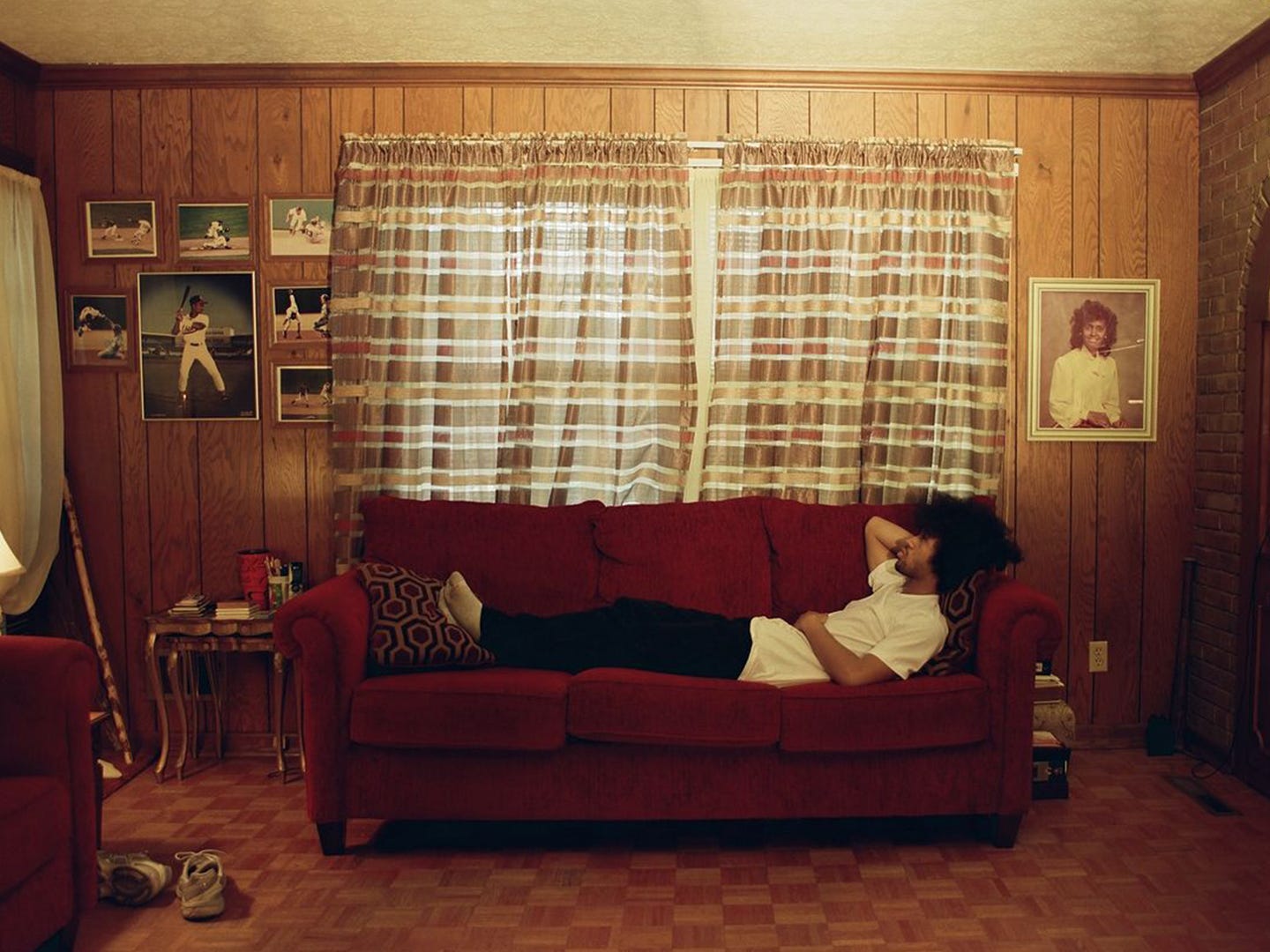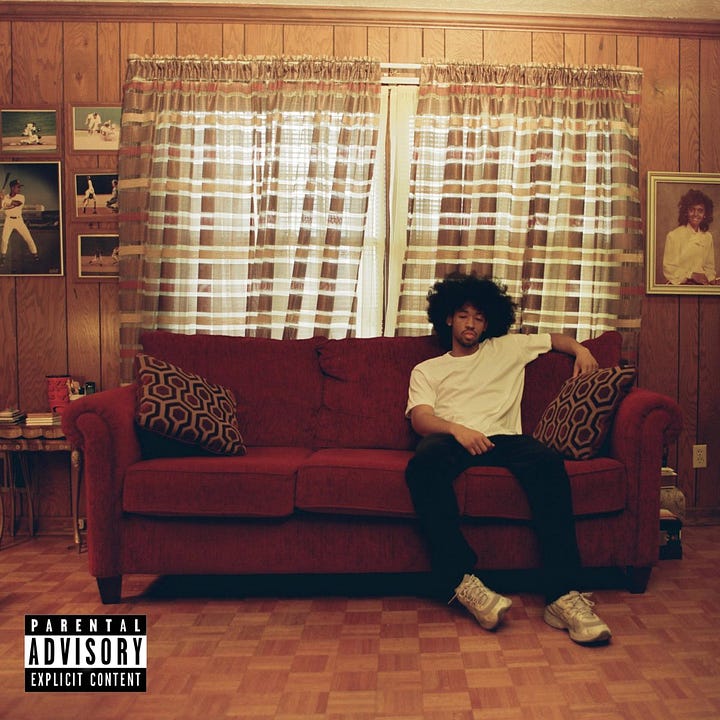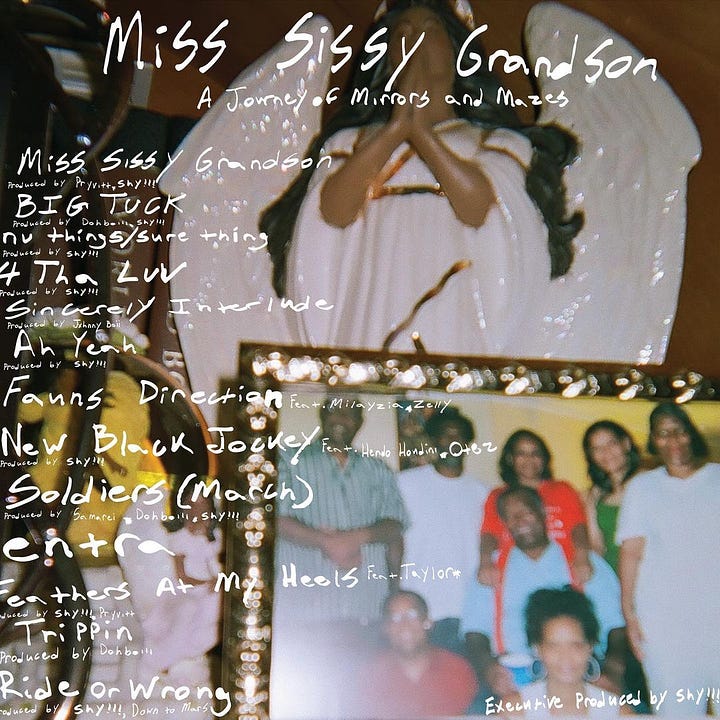Horace Gaither Returns Home to Himself on New Album 'Miss Sissy Grandson'
Louisville rapper's latest LP is an ode to the moments that shaped him

On the cover of Horace Gaither’s new album, Miss Sissy Grandson, he sits on the right side of his grandma’s lipstick red couch. Lounging between vintage photos of his dad and grandmother, the 22-year-old rapper from Louisville, Kentucky is looking to remember.
“A big part of my music is nostalgia, especially with this project, because I think everybody has their own personal relationship with the past,” Gaither shared with me from his dorm at the University of Louisville, where he is a Communications major with a minor in Anthropology.
Gaither continued, “Everybody’s got good and bad relationships with the past, and family is a big part of that nostalgia.”
I discovered Gaither’s music on Spotify after the algorithm recommended Miss Sissy Grandson to me. I was struck by the familiar feeling in Gaither’s album artwork and how the title is written the way my people—Black people—say it.
Listening to the 13-song, full-length project, I connected with the sample-soaked production from shy!!!, who also produced “Questions” on Jack Harlow’s latest album Jackman., and Gaither’s steady lyricism and sincere storytelling.
Gaither, who has been rapping since age 14, recognizes how important his people are on this journey. “Family is my identity,” said Gaither. After two years at the University of Kentucky, with many weekends spent driving back to Louisville for shows and video shoots, he decided to move back home closer to his family and transfer to UofL.
“In Louisville, I have a really big family,” laughed Gaither. “Like, even today, I run into people, and then my dad will call me like, ‘You know that’s your cousin, right?’ It happens all the time.”
Gaither’s family memories are intertwined with his faith, and these influences show up in his music. One of the primary samples on Gaither’s lead album single “nu things / sure thing” is the title track from SWV’s New Beginning where they declare, “Jesus is our inspiration.”
“I was raised with my granny, so I'm going to be in the church. That's one thing for sure,” reflected Gaither. “But how my parents and grandparents taught God to me, it was never anything that I took as forceful or abusive.”
Gaither returns to these early memories and his younger self on Miss Sissy Grandson. On the album’s final interlude “entra,” which is an inflection of the Spanish word entrar, “to enter,” a woman’s voice narrates the maze concept, inspired by Pan's Labyrinth, referenced throughout the project.
“The idea of Horace Gaither has fallen,” she recites. “Staring back at him is Miss Sissy Grandson.”
“Everybody’s got good and bad relationships with the past, and family is a big part of that nostalgia.”
Gaither shared how the album represents him entering a maze. “I have my pride. I have my ego. I have every label that I set on myself, and I have every label that other people have put on me. Other people's perceptions that I've adopted. I wear that on me,” he began to explain.
“As I step into this maze, I'm fucking up,” Gaither continued. “I'm hitting dead ends. I'm making wrong turns. I'm stumbling. I'm falling. And as I'm messing up, those perceptions that I have are slowly peeling off. I'm slowly losing the labels. The ego. The pride that I had held so close to.”
But at the center of the maze, Gaither pictured a mirror, and he saw his true self in the reflection. He determined, “After all of your mistakes you've made, and all of the mess-ups, you've made the progress of finding who you truly are.”


In Gaither’s case, the truest version of himself is as a descendant of his grandmother. “Before I was Horace Gaither, the rapper, before I was Little Horace to all my niggas and all my cousins, I was this little kid running around church, and people were like, ‘Who's that kid?’ ‘Oh, that’s Miss Sissy Grandson.’”
“Before everything, I was Miss Sissy Grandson,” recalled Gaither. When writing music, he finds himself writing to this younger version of himself at times or rapping from the perspective of his younger self. On “Ah Yeah,” Gaither raps, “I do this for the younger me, nigga, that’s my lil brethren.”
Before we wrapped our conversation, I asked Gaither what he would tell Little Horace now, as well as what he has learned from his younger self. At first, Gaither, who doesn’t consider himself “the nigga that's just teaching niggas all the time,” didn’t know if he’d say anything. But then, he answered, “I would tell the younger me to just keep doing him.”
“After all of your mistakes you've made, and all of the mess-ups, you've made the progress of finding who you truly are.”
Believing that the “mistake itself is what pushes you forward,” Gaither continued, “If I could say anything to the younger me, I’d thank him because the mistakes that he's gonna go through and all the slip-ups is the reason why I'm here today.”
On the lessons Little Horace is teaching him, Gaither returns to his family—specifically his dad, whose old baseball pictures are framed on the front cover of Miss Sissy Grandson.
“As a young kid, I had these real deep talks with my dad about the complexities of different people and why certain people act different ways, and it helped me have a sense of empathy and always imagining myself in somebody else's shoes,” remembered Gaither. “That’s something I don't ever want to lose.”





502 come up let’s goooo ⚜️